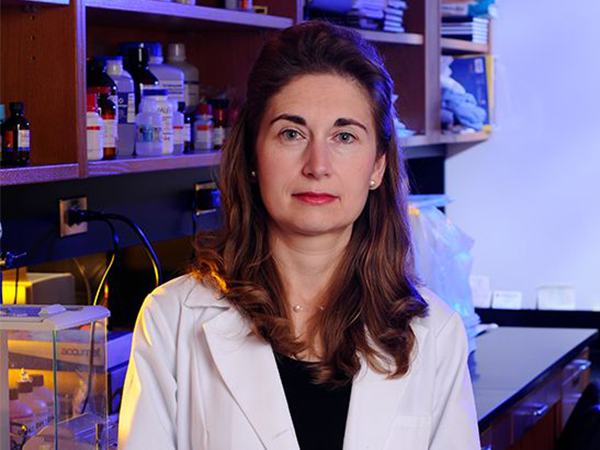 Anath Shalev, M.D.The University of Alabama at Birmingham startup TIXiMED, Inc., has successfully completed a Phase 1 single ascending dose study of the drug TIX100 in humans, marking a key milestone in the development of a first-of-its kind oral therapy for Type 1 diabetes (T1D). Currently, people with T1D still depend on multiple daily insulin injections or insulin pumps to stay alive and manage their disease.
Anath Shalev, M.D.The University of Alabama at Birmingham startup TIXiMED, Inc., has successfully completed a Phase 1 single ascending dose study of the drug TIX100 in humans, marking a key milestone in the development of a first-of-its kind oral therapy for Type 1 diabetes (T1D). Currently, people with T1D still depend on multiple daily insulin injections or insulin pumps to stay alive and manage their disease.
TIX100 is a small molecule that works by targeting thioredoxin-interacting protein (TXNIP), a detrimental protein that is elevated in people with diabetes and leads to beta cell death and pancreatic islet dysfunction. As such, it addresses an underlying cause of the disease.
TIXiMED began in 2021 as a startup in the Bill L. Harbert Institute for Innovation and Entrepreneurship as a way for UAB Heersink School of Medicine Professor Anath Shalev, M.D., to develop this exciting new approach based on her decades-long research and discovery around TXNIP into a novel treatment option for people with diabetes.
TIX100 has been shown to be highly effective in preventing and reversing diabetes in preclinical studies. In 2024, it was approved as an investigational new drug by U.S. Food and Drug Administration and cleared for human trials. The Phase 1 Single Ascending Dose (SAD) study in humans began in January 2025 and was completed in May.
Safety and tolerability in humans
“We are thrilled to report that the Phase 1 SAD study in humans has confirmed TIX100 to be safe and well-tolerated across all tested dose levels in healthy subjects,” said Shalev, Nancy R. and Eugene C. Gwaltney Family Endowed Chair in Juvenile Diabetes Research in the UAB Department of Medicine Division of Endocrinology, Diabetes and Metabolism and director of the UAB Comprehensive Diabetes Center.
“This double-blind, randomized, placebo-controlled Phase 1 SAD study evaluated the safety, tolerability, and pharmacokinetics of TIX100 at escalating doses in 28 healthy adults,” Shalev said. “Clinical and laboratory results demonstrated no drug-related adverse events, no ECG changes and no hypoglycemia with TIX100 exhibiting a favorable safety profile and predictable pharmacokinetics, supporting progression to the next phase of clinical development.”
In addition to demonstrating safety and tolerability in humans, post-hoc analysis revealed a promising first biological TIX100 signal in humans. Analysis found decreased post-meal blood glucose excursion and improved glucose homeostasis after a standardized liquid meal in the two highest dose cohorts, providing the first evidence of a biological TIX100 effect in humans.
“We are also excited that, despite the small sample size and healthy study population, a promising metabolic TIX100 signal became evident at the human dose predicted in preclinical models,” Shalev said. “These findings also suggest that stronger effects might be observed in people with diabetes and bring TIXiMED closer to delivering a novel oral therapy that addresses the underlying causes of T1D, offering hope for improved outcomes for patients across all stages of the disease.”
Following these encouraging results, TIXiMED announced it is now preparing to initiate a Phase 1 multiple ascending dose (MAD) study to assess longer-term TIX100 safety, tolerability, and pharmacokinetics in healthy subjects and pave the way for a Phase 2 trial in individuals with T1D.
A patent for invention
Harbert Institute helps to translate UAB discoveries and ideas into new products and startup businesses and continues to celebrate Shalev’s pioneering work. The institute awarded Shalev the Excellence in Entrepreneurship Award in 2024, the institute’s highest honor. Most recently, Harbert Institute presented Shalev and researchers in her laboratory, Gu Jing, Ph.D., and Junqin Chen, Ph.D., with patent coins honoring their dedication and years of hard work that led to TIX100.
“Ever since Dr. Shalev first disclosed the novel research that would lead to the creation of TIX100, we at the Harbert Institute have been proud to support her and her team in every way possible as they continue to innovate in the field of diabetes treatment research,” said Karthik Gopalakrishnan, Ph.D., senior director of the Harbert Institute. “We look forward to seeing the results of further human trials and, hopefully, to TIXiMED eventually offering a novel treatment to those suffering from Type 1 diabetes.”